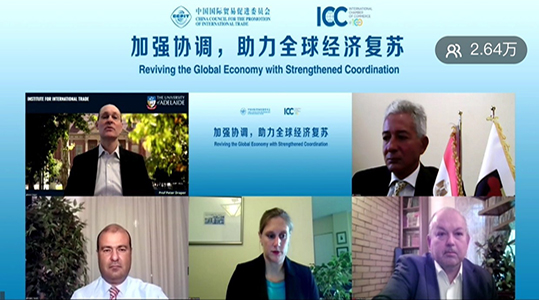The Secretary-General of the Union of Arab Chambers, Dr. Khaled Hanafy, indicated that “the Corona pandemic has led to a significant decrease in growth rates in all countries of the world, especially in Arab countries that will face an economic contraction of 4.2 percent at the very least, and it is possible that the recession goes deeper if the epidemic continues."
Hanafy said that "the preliminary estimates indicate that the Arab region may lose $42 billion of GDP, and the unemployment rate in the region may increase by at least 1.7 million jobs in 2020."
Hanafy's words came during his participation in the panel discussion held during the joint extraordinary virtual business conference entitled: “Reviving the global economy by opening markets and strengthening cooperation,” which took place on 9/28-2020 under a joint organization between the International Chamber of Commerce and the Chinese Council for the Promotion of International Trade, with wide official and economic participation from all over the world.
Hanafy confirmed that "companies across the region have already recorded this year huge losses in its market capital amounting to 420 billion US dollars, with the resulting loss of wealth equivalent to 8 percent of the region's total wealth," noting that "the most affected sectors by this reality are travel, tourism and small and medium-sized companies."
He said, "The Union of Arab Chambers and its members from Arab chambers are well aware that the main key to revitalization is the partnership between the public and private sectors. Indeed, many Arab chambers have modified their activities to respond to the challenges of the epidemic, and many federations of Arab chambers have digitized their services, but there is no doubt that there are differences." They are broad among Arab countries in terms of digital capacity, innovation and infrastructure, as their ranking for the 2019 Innovation Index varies greatly between the 36th (United Arab Emirates) and 129 (Yemen) out of 130 countries in the world.
Hanafy stressed that "companies need to work in a new technological work environment, where innovation and adaptation are essential elements," noting "the need to move to a circular economy, because it may be the most sustainable, which requires most companies, whether in the Arab region or around the world, to change its business models and methods of cooperation."
Source (Union of Arab Chambers)

